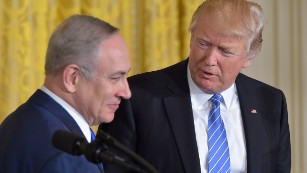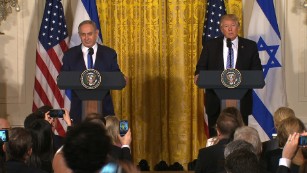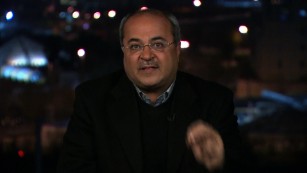PeaceGen
BANNED

- Joined
- Jun 2, 2012
- Messages
- 3,889
- Reaction score
- 0
- Country
- Location
source : http://edition.cnn.com/2017/02/15/politics/trump-netanyahu-two-state-solution-israel-palestinians/
CNN is also talking about Trump's so-far light pressure to curb (delay/cancel) new settlement building by Israel, and how that fits in a 2-state solution,
and
how a 1-state solution (whereby Palestinians would be included as citizens of a Jewish state) would have no definitive majority of Jews (which i suspect to be scary or at least undesirable by Jewish Israelis),
and how
a 1-state solution with many 'Palestinian Israelis' could be perceived as not democratic.
It seems the Isreali leaderships need some time to think of a counter to the current 2-state/1-state paradoxes.. They probably dont want either a 2-state or a 1-state solution (that leaves them vulnerable to the undemocratic/non-democratic label by their many opponents internationally)
This is a decidedly Muslim forum. I'd like to see this thread list options for all leaderships involved, the Israeli, the Palestinian, and the supporters of Palestine.
Please do not engage in warmongering, i'll be monitoring this thread daily and will be very firm against all warmongerers in this thread.
Trump backs off two-state framework for Israeli-Palestinian deal
Washington (CNN)President Donald Trump rejected the long-established US framework for Middle East peacemaking at a White House visit with Israeli Prime Minister Benjamin Netanyahu Wednesday as he announced his desire to reach "the ultimate deal."
In staking his claim to a prize that has eluded many a leader before him, Trump previewed the nascent outlines of an approach that -- if he sticks with it -- ditches bipartisan orthodoxy, borrows some old ideas and, Middle East experts say, will be no easier to pull off now than in the past.
As Trump declared his deep support for the Jewish state, he abandoned the bedrock principle that the solution to the Israeli-Palestinian conflict will come via two states for two peoples. Instead, he referred to the possibility of an Arab-backed peace process, an idea that's been floating around since the beginning of this century without producing results.
"The United States will encourage a peace and really, a great peace deal," Trump declared at a news conference alongside Netanyahu. "We'll be working on it very, very diligently."
Asked whether he was abandoning the idea of a two-state solution, Trump said, "I'm looking at two-state and one-state, and I like the one that both parties like."
He continued, "If Israel and the Palestinians are happy, I'm happy with the one they like the best."
He also said at one point, "It is the parties themselves that must directly negotiate. Both sides will have to make compromises." Then turning to Netanyahu, he added a question: "You know that, right?"
UN Sec Gen: 'No plan B'


http://edition.cnn.com/2017/02/15/politics/trump-netanyahu-two-state-solution-israel-palestinians/#
What's the Israeli-Palestinian two-state solution? 00:55
UN Secretary-General Antonio Guterres, speaking in Cairo alongside the Egyptian Minister of Foreign Affairs, stressed that the Israelis and Palestinians must not abandon a commitment to a two-state solution.
"There is no Plan B to the situation between Palestinians and Israelis but a two-state solution and that everything must be done to preserve that possibility," he said in remarks to the press.
The night before Netanyahu's arrival at the White House, senior administration officials cast doubt on the two-state solution, which the international community still holds as the basic foundation of any agreement. The US explicitly called for that arrangement under Republican President George W. Bush and Democratic President Barack Obama.
The Trump official's comments drew a response from PLO Executive Committee Member Hanan Ashrawi, who said that if Trump was "trying to create alternative realities, then he should spell out what the options are. A one-state solution would require equal rights and citizenship for all, unless he is advocating an apartheid state."
There are growing questions about whether a two-state solution is even possible, given Israel's continued settlement building, said Diana Buttu, a former spokeswoman for the Palestinian Liberation Organization who now teaches at Harvard University.
Since Trump's inauguration, Israel has announced 6,000 new settlement homes and legalized settler outposts in the West Bank.
"They've done that for 20 years, say they want a two-state solution, build settlements and destroy Palestinian homes," Buttu said. "That's not the behavior of someone who wants peace."
As a result, young Palestinians are "increasingly talking very openly about a struggle for one person, one vote," Buttu said.
Many Israelis, on the other hand, say that the Palestinians haven't warmly embraced a two-state solution either, pointing to polls showing that the idea has dropping support among the Palestinian public and arguing that its leaders haven't been willing to participate in the direct talks needed to reach an agreement.
Netanyahu, Trump push reset of US-Israel relationship
Netanyahu, who endorsed the idea of two states in 2009 under pressure from the Obama administration, sidestepped questions about whether he still supports the concept Wednesday, saying instead he wanted to avoid "labels" and talk substance: the need for Palestinians to recognize Israel as a Jewish state and the need for Israel to have overriding security control. It's not clear how Netanyahu is going to persuade them to come to the table.
He also didn't give a direct response when asked whether he would comply with Trump's request at the news conference that he "hold back" on settlement expansion.
Pressed by reporters later Wednesday, the Israeli Prime Minister replied, "I think we'll try to find a common understanding that is consistent with pursuit of peace and security."
It was an early indication that getting the parties to comply with US aspirations in the Middle East can be a challenge.
Natan Sachs, a fellow at the Center for Middle East Policy at the Brookings Institution, said that for Netanyahu, the point isn't so much "to get to the deal with Palestinians, but to change the parameters and include the Arab states. That would be good for Israel if there is a deal with Palestinians, and it would be good for Israel if there isn't a deal."
States aligned with Israel in their dislike of Iran include Jordan, Egypt, Saudi Arabia and the Gulf states. Israel has forged close but quiet security ties with these Sunni-majority nations over that shared view of Tehran. Now, Netanyahu is hoping to make those relationships more open and win Arab recognition of Israel by drawing these countries into negotiations on Mideast peace.
"I believe the great opportunity for peace comes from a regional approach," Netanyahu said at the White House, "from involving our newfound Arab partners in the pursuit of a broader peace and peace with the Palestinians."

[/paste:font]
Netanyahu: No greater supporter than Trump 02:28
Trump described the idea of Arab involvement as "actually a much bigger deal, a much more important deal in a sense. It would take in many, many countries and it would cover a very large territory."
Trump has said his chief negotiator for Middle East peace will be his son-in-law, Jared Kushner, who has already been meeting with influential Arab leaders, such as Jordan's King Abdullah and UAE ambassador to the US Yousef al-Otaiba.
"I think we have some pretty good cooperation from people in the past who would never, ever have even thought about doing this," Trump said, "so we'll see how that works."
Sachs said that Trump seems to think the regional approach is new.
"It's not," he said, pointing to a 2001 Saudi initiative that proposed Arab recognition of Israel in exchange for peace with the Palestinians and Syria and an independent Palestinian state whose capital was East Jerusalem.
It was adopted by the Arab League in 2002 and re-endorsed in 2007 but has yet to lead to a resolution to the conflict.
While Jordan and Egypt have formal peace deals with Israel, Gulf states don't have formal diplomatic relations with Jerusalem and would have to sell a deal to their citizens before publicly improving ties.
"They've got to be able to sell their closeness to Israel to their own domestic politics as, among many other good things, something that's helpful to the Palestinians," said Hussein Ibish, a senior fellow at the Arab Gulf States Institute. "The idea that Israel wouldn't have to do much on the Palestinians and have major progress with the Gulf states, that's a misread of the political dynamics."
CNN's Ted Barrett and Becky Anderson contributed to this report.
CNN is also talking about Trump's so-far light pressure to curb (delay/cancel) new settlement building by Israel, and how that fits in a 2-state solution,
and
how a 1-state solution (whereby Palestinians would be included as citizens of a Jewish state) would have no definitive majority of Jews (which i suspect to be scary or at least undesirable by Jewish Israelis),
and how
a 1-state solution with many 'Palestinian Israelis' could be perceived as not democratic.
It seems the Isreali leaderships need some time to think of a counter to the current 2-state/1-state paradoxes.. They probably dont want either a 2-state or a 1-state solution (that leaves them vulnerable to the undemocratic/non-democratic label by their many opponents internationally)
This is a decidedly Muslim forum. I'd like to see this thread list options for all leaderships involved, the Israeli, the Palestinian, and the supporters of Palestine.
Please do not engage in warmongering, i'll be monitoring this thread daily and will be very firm against all warmongerers in this thread.







